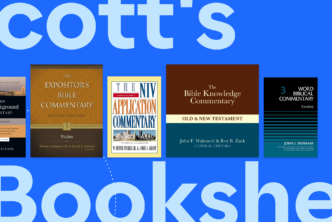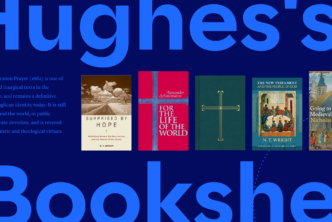
If there is one thing my friends know about me, it is that I am a bibliophile—especially when it comes to good academic books that help me study the New Testament. Not only have I collected hundreds of books as a professor (and formerly as a doctoral student), but before that, I worked for a publisher (Hendrickson), as well as CBD (Christian Book Distributors). During my short stint working for CBD, I was also volunteering with a middle-school ministry where the kids (endearingly?) referred to me as “the book guy.”
Anyway, I often get asked about book recommendations by students, friends, and readers of www.cruxsolablog.com, and I thought it high time I shared my list of 50 books on the New Testament that every Bible nerd should read. Caveat: this is my starter list, so it is subjective and incomplete, and it avoids massively long books wherever possible (expect a few key exceptions). I am thinking particularly of college students, seminarians, and pastors who want to dive into New Testament scholarship. When I look back on the shaping of my understanding of the New Testament, these are the books that stick out to me. Please share yours as well, in the comments. I’m always up for reading another!
I’ll divide my list into five posts highlighting five subjects related to the New Testament (Paul, Gospels, New Testament background, New Testament theology/ministry, and Scripture/hermeneutics/ethics).
Here goes! (In author-alphabetical order, because I’m weird that way.)
Gospels
We’ll start with Dale C. Allison’s The Historical Christ and the Theological Jesus. Allison has written a lot, but this book (~100 pp.) offers a nice, personal reflection on the challenges of bringing history and theology to the table of the conversation about Jesus. It helped me get a personal perspective to help me process the messiness of “questing” for Jesus. (For a heftier study, try Allison’s Constructing Jesus: Memory, Imagination, and History.)
Next we have Paul N. Anderson’s The Riddles of the Fourth Gospel. This is an introductory book, but Anderson did two really important things for me. 1) He introduced me to the paradoxical aporiae in John (the paradoxical stuff that makes you scratch your head), and 2) then he offered key pointers toward putting them into a wider, sensible framework. He also made a powerful argument for taking John more seriously historically.
Perhaps I could be faulted for not starting off this discussion with Dietrich Bonhoeffer’s classic The Cost of Discipleship—not a normal “academic book,” but hugely influential, and for good reason. If you put this book in context (Nazi Germany) and read between the lines, it could have easily signed his death warrant from Hitler. It’s a bold (and fair) reading of the Sermon on the Mount that reminds us that Jesus calls with grace, yes, but he calls us to die.
One thing I regularly teach my students is that you will get the gospels wrong if you can’t figure out what they are trying to teach, and that leads to a genre question. Richard Burridge drove my understanding of the gospels forward in monumental leaps with his overall work, but especially What Are the Gospels? By comparing the gospels to ancient Greco-Roman biographies, he was able to show me that historical works in that time were, by nature, moral works aimed at promoting imitation of a heroic character. (I benefited also, in similar ways, from his Imitating Jesus.)
Genre is helpful. So is making sense of the gospels as narratives. My eyes were opened to the world of “narrative criticism” by Alan Culpepper in his Anatomy of the Fourth Gospel—a new classic! Now I cannot read the gospels (or any other narrative) without asking questions about narration, plot, and characterization—a gift and a curse. (How do I turn off the processing?)
What about what the church should do with the gospels today? Perhaps no book on the gospels has had a stronger impression on me than Luke Timothy Johnson’s short Prophetic Jesus, Prophetic Church, a stirring study of Luke-Acts in view of Luke’s shaping of a prophetic vision of Jesus and the people he sent in mission.
Craig Keener has also impacted me in my study of the gospels, but his books are much longer! I have so many of Keener’s works, but I would recommend his two volumes on Miracles, where he has taken on the old claim that Jesus couldn’t have done miracles because they just don’t happen and they are not a part of life experience. Keener traveled all around to record and analyze claims of the miraculous and has made a strong case that we really need to open our eyes and ears, rather than just running at the mouth!
I have taught John’s gospel many times, and I have learned so much from Craig Koester—especially from his Symbolism in the Fourth Gospel. This book helped me see the powerful use of symbols and metaphors in the New Testament. (See also his outstanding The Word of Life: A Theology of John’s Gospel.)
Everyone should read something on Jesus and the gospels by Scot McKnight. It’s hard to choose, but I found his recent Sermon on the Mount commentary gripping: hermeneutically responsible, historically informed, and pastorally satisfying. You will never see Jesus’ most famous teaching the same again!
N.T. Wright—No doubt he’s a power player in the historical Jesus arena, so I have to mention his epochal Jesus and the Victory of God. When I first began reading it, it made little sense to me. I have picked it up here and there later on and found it helpful, as I have understood the shape of Jesus studies throughout history and today better. However, I was really blown away by his When God Became King, a holistic and theological reading of the wider story behind the gospels, a story which brings together Jesus’ preaching and ushering in of the kingdom of God with his death and resurrection. I have used it as a textbook, and I would use it again and again. Not uncontroversial, but absolutely worth reading. One thing I love about Wright’s work: he repeatedly inspires me to turn back to the Old Testament to help make sense of the New.
Next time: Paul. Stay tuned.





